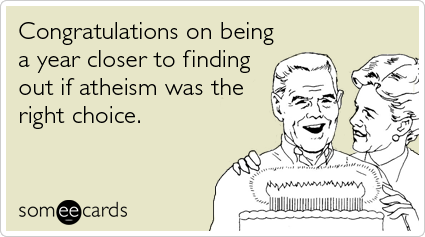
The following image was posted on my friend's Facebook for his birthday.
I couldn't help but notice the contradiction within it, and began to converse with my friend on an aspect of Pascal's Wager.
The following is the conversation... Is it just me or did he just keep dodging my question? Perhaps he doesn't find comfort in the fact that his worldview brings no hope.
Rich Feola: Wouldn't it be more proper to say the following?: "Congrats on coming one more year closer to finding out if atheism was the wrong choice?". If atheism was the right choice, you would never know because there is no afterlife according to atheism!
Noam Opitz (Atheist): From a grammar perspective I'd have to say no. The best would be, "Congradulations on being a year closer to finding out if Atheism was the best choice." Right or wrong on this is a matter of opinion and belief.
Rich Feola: Noam, could you answer the following question for me? When, after dying, will you be able to say to yourself, "I have now found out that atheism was the best choice"?
Noam Opitz: If I'm wrong, then yes. If I'm right, then no.
Rich Feola: I agree that we dont have exhaustive knowledge where we with 100% certainty can say yes or no. but that's not what I asked you. I asked you WHEN, if atheism is true, would you be able to know 100% that it actually was true?
Noam Opitz: Yes, I would. Because I'd be dead and nothing more would happen. If something did happen, then I'd be 100% sure one way or another.
Rich Feola: Once again, (sorry to seem annoying), I didn't ask you HOW you would know either way or not. I asked you WHEN (that means a specific time) you would know that atheism was indeed true.
Noam Opitz: I have already answered your question. Can you find it?
Rich Feola: You have not answered my question. You basically said, "I'd be dead and then nothing more would happen". but how would you KNOW if you were right or wrong? According to atheism, dead people don't know anything... They can't think once their brain ceases functioning. Since it appears you are not following my reasoning (sorry if I explained it poorly), let me explain:
If atheism is true, then when an atheist dies... He is dead. There is no more opportunity to think or to reason. Therefore, the atheist can never reassure himself whether he was actually right or not (IF he is correct). To conclude, the atheist will never actually be able to know (with 100% certainty) that atheism is correct if it is indeed correct.
Rich Feola: Therefore, it is impossible to come one year closer to finding out if atheism was a good choice. It can only be a bad choice... Or a choice with no answer.
Noam Opitz: I give you a gold star for trying, but you still don't seem to get it. Its not whether it was a good or bad choice, but right or wrong. You're arguing opinion, to me being a slave in Heaven is not a good afterlife, but it may be to you. I'm arguing facts. Until you can prove otherwise beyond a reasonable doubt, I will believe that its the RIGHT choice, not whether its good or bad. I am 100% sure that Atheism is the RIGHT choice, and when I die if I'm wrong I will accept that. Same as everything else. Until then, its up to you to prove me wrong, up until that point I am 100% sure. So, it is possible to come one year closer. Its all a mater of opinion.
Rich Feola: I'm sorry to confuse, I meant right and wrong to be included in the terms good and bad (since I used terms "right" and "correct" or "wrong" and "incorrect" in all my previous sentences as well). If atheism is not true, then holding it is definitely a bad idea. I was not arguing subjective opinion, but the objective results of holding the opinion.
But you still have dodged my question. The question is not whether atheism is a right choice for RIGHT NOW. The question is whether you can know if atheism is right AFTER YOU DIE. The fact is that you cannot know if atheism is right after you die just like you can't know who will be President after you die, or whether the Cubs will ever win the World Series. You cant know anything after you die (according to atheism), including whether atheism was correct or incorrect. That was my only point.
Rich Feola: In order to determine that there is no afterlife, one would have to be consciously aware of there being no afterlife after they die (a contradiction in terms according to atheism).
You also brought up a bizarre point. You are 100% sure that there is no God? That is illogical. The only way to be 100% sure that there is no afterlife or God would mean that you know 100% of all the information that could possibly be known in the universe (as well as outside of the universe). To know that there is no God with 100% certainty is impossible for a finite human being. You can affirm it as strongly as you like as an opinion, but that is a far cry from having 100% certainty. Even Richard Dawkins (the world's most renowned voice for atheism) is not THAT sure that there is no God--and I sent that article that darinhouston shared the other day (http://www.telegraph.co.uk/news/religio ... exist.html).